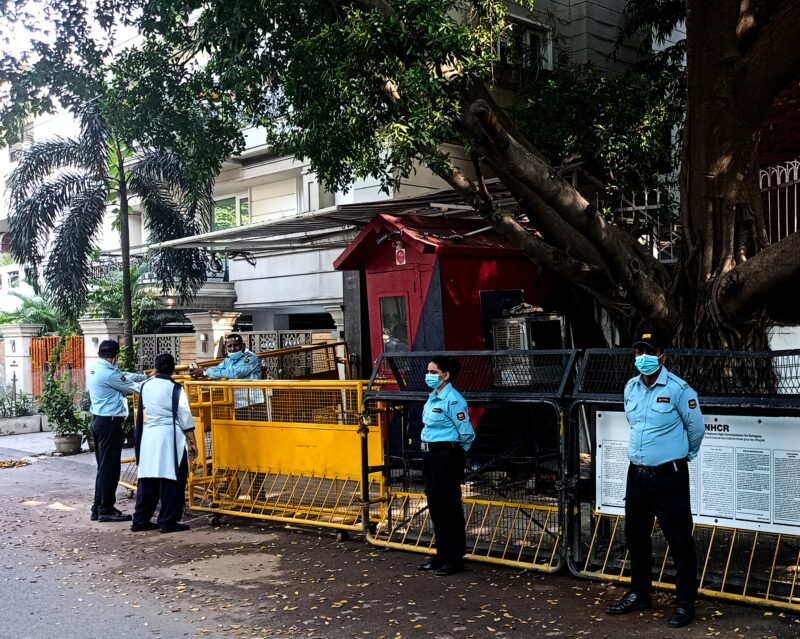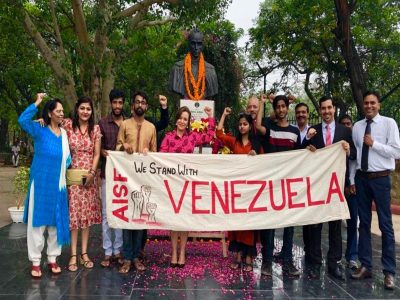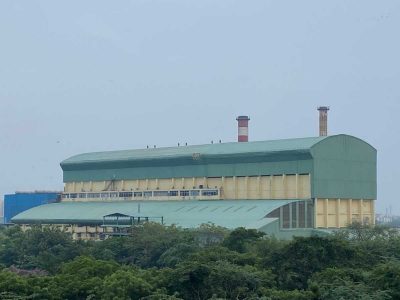Vertika Mani, a lawyer and activist working with the Indian Friends for Refugees (IFR) recently shared a video in which a person with an open surgical wound was seen protesting in front of the United Nations High Commission for Refugees (UNHCR) at Vasant Vihar.
The man was displaying his wound in front of the UNHCR office while the security personnel stood at the closed entry gates with barricades.
Another person behind the camera yells at the guards who are seen to be completely apathetic. “From the next year onwards, there won’t be a single official but security guards and armed personnels at UNHCR”, he shouts at the police officers and guards visible in the video.
One of the refugees present at the protest informed Patriot that the UNHCR closed all of its gates for them. “Earlier, we were at least able to enter the UNHCR in order to discuss our grievances and to inform them about the issues we faced. Times have changed, and all we have are closed doors, barricades and the guards to shoo away the refugees,” he said in Arabic.
Mani states that such protests have turned into a regular sight in front of the UNHCR. “It is heartbreaking that people who were forced to leave their homelands and their loved ones are living in very vulnerable conditions. They sought refuge in a completely foreign land and were assured by the UNHCR that they’ll be protected at all costs. However, the promises have proved hollow on multiple occasions,” she said.
Out in the cold
Situated at a very posh location in Delhi’s Vasant Vihar, the UNHCR stands surrounded by the embassies of multiple countries. When Patriot reached the site, there were guards, security personnel, barricades and three women sitting on a mat in front of the building.
Sana, one of the trio, stated that they had been staging the sit-in for the past one week. “We can’t go home to Afghanistan and our visas are about to expire. We are stuck here with the fear of being deported”, she stated.
Joining in the conversation, another protester said, “We are in a situation where we can’t go back to our homeland and if the visa expires, we won’t be able to remain in India as well.”
“We don’t have a place to go and approach other than the UNHCR”, she continued. “But the UNHCR is not paying any attention to our demands. Several days and nights have passed as we remain here with a small tent, with almost no help from the authorities.”
“Several refugees from several countries come here with their grievances. We don’t have any option other than this, while the UNHCR remains as a silent spectator. Some of them remain here, like us, without any choice while others come to protest and demonstrate at regular intervals”, stated Saleh, a refugee from Yemen.
“We are not familiar with each other’s language or the way we speak,” said Saleh, switching to Arabic. “We might not understand the words and their meaning but we understand the feelings. Refugees from multiple countries come, yell, shout and demonstrate in front of the UNHCR in their own dialects and languages. We are not doing that but we know how they feel.”
“The UNHCR is our only hope. There came a time when our own homelands became so toxic for us that we were forced to leave, with a hope to return some day. It pains us that we are talking to a wall and not the United Nations High Commission for Refugees”, stated Saleh.
UNHCR’s response
Patriot tried reaching out to the officials at the UNHCR several times since the incident but the efforts have been in vain. However, a senior administrative official at the UN body answered a few questions to an interlocutor under the condition of anonymity.
“They have run away from their homelands and are now living in India,” stated the official. “However, they’re still unhappy and ungrateful. We have given them a place to live and sleep peacefully, what else do they need from us? Are we supposed to prepare their beds as well?”
He stated that refugees come to the UNHCR office with multiple demands, some asking for relocation to a third country, others for medical and financial assistance and sometimes residential assistance as well. “It is a long process and the UNHCR is taking the required time”, he stated, declining to answer any further questions.
Patriot emailed questions to the UNHCR about the situation and demands of the refugees. Despite multiple reminders, there was no response to any of the questions.

Legal perspective
Lawyers and activists who are part of IFR stated that a major problem is that the UNHCR takes years and years to determine the refugee status.
Vertika Mani informed Patriot that one of the major reasons that the UNHCR is not able to help the refugees is that India has stopped giving residential permits to them even if they are recognised by the UN body.
The other reason is the lack of a law for the refugees. “Refugees are a distinct group of immigrants who require legal protection and this has been recognised by the Indian courts. The right of the refugee not to be sent back to a country where his or her life would be in danger or where they are likely to be tortured, imprisoned, or put to death has been recognised by the legal system. The UNHCR is also acknowledged by India, and those refugees who are under its recognition are offered protection as well, but the lack of a law remains a big loophole in the due process”, stated Vertika.
She added that the lack of communication between the UNHCR and the refugees has also widened the gap. IFR, as a result, has drafted a list of demands to address refugee concerns.
The most basic of all demands is to recognise the rights of the refugees. “An assurance by the government that UNHCR-recognised refugees would get residential permits along with long-term visas and an identification card is a first step to their legal recognition”, Mani continued.
Most important of all is the formation of a just and humane law for the protection of refugees. Until that happens, refugees will continue to knock at the gates of the UNHCR in hope of some assistance.
Follow us on:
Instagram: instagram.com/thepatriot_in/
Twitter: twitter.com/Patriot_Delhi
Facebook: facebook.com/Thepatriotnewsindia





